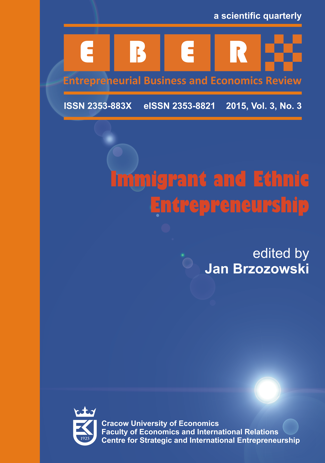
Immigrant and Ethnic Entrepreneurship
The importance of businesses started and developed by immigrants is host countries is substantial. Just in the US, 90 of the enterprises listed on Fortune 500 have been founded by immigrants, and additional 114 have been started by the second-generation immigrants, i.e. children of foreign-born persons (cf. Partnership for a New American Economy, 2011). As the contribution of immigrant entrepreneurship for the global economy is recognized by policy makers and experts, it is also reflected in the growing research on this topic. Research papers on immigrant and ethnic entrepreneurship have increased in numbers in 2000s and in the second decade of 21st century, including articles in such respected journals as Entrepreneurship Theory and Practice (Drori, Honig, & Wright, 2009), Small Business Economics (Mueller, 2014) or Entrepreneurship and Regional Development (Aliaga-Isla&Rialp, 2013).Still, this emerging and rapidly growing field of study suffers from a number of limitations. The first one is the concentration of the bulk of the research on a small number of countries (mostly the US and Canada) and few, selected ethnic groups (Latino, Chinese, Korean). The second deficiency is the modest number of theoretical concepts developed for the analysis of the phenomenon, especially the development of immigrant enterprises. Another gap in the current research is the small number of quantitative approaches, as most of the studies remain qualitative. Then, there are several underserved topics, including less popular geographical locations, disadvantaged immigrant ethnic groups (especially refugees), immigrant entrepreneurs at the risk of marginalization on one hand, and the successful intentional immigrant entrepreneurs on the other, and the gender perspective just to mention the most obvious candidates. Finally, the most visible drawback in current research agenda is the limited interdisciplinary approach both to empirics and theory. Although immigrant entrepreneurship research is firmly established within the business/entrepreneurship studies, it needs a more comprehensive dialogue with the migration studies, including such disciplines as sociology and anthropology.Our thematic issue on immigrant and ethnic entrepreneurship aims to address at least some of the aforementioned research gaps.
More...




